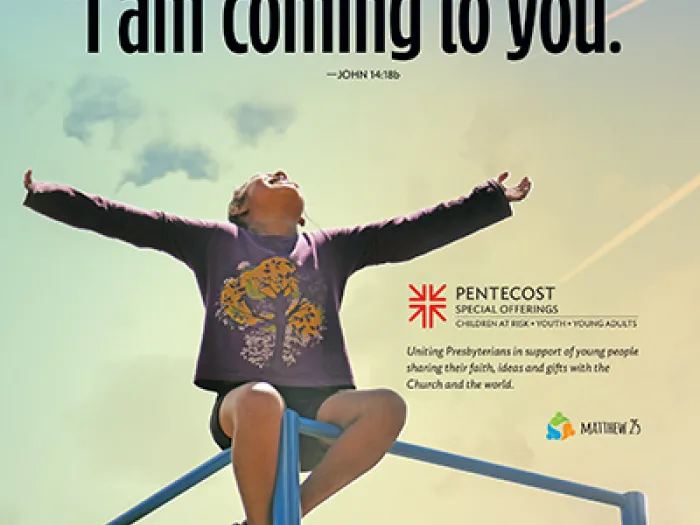Minute for Mission: International Day for the Elimination of Violence Against Women
Daily Readings

November 25, 2024
This year marks the 25th anniversary of the U.N. General Assembly’s designation of Nov. 25 as the International Day for the Elimination of Violence Against Women. The day serves as an annual reminder of the power of collective solidarity, which is needed from one year onto another to change the structural inequities posed by violence against women. The day also launches 16 Days of Activism Against Gender-Based Violence organized by civil society around the world, including the Church, to join forces to address violence against women as the most pervasive breach of human rights worldwide. The annual campaign concludes on International Human Rights Day, Dec. 10.
Achol Kur (Evangelical Presbyterian Church in South Sudan, SSPEC) speaks on child, early and forced marriage.
In a statement to the 64th Session of the Commission on the Status of Women in 2020, “the Presbyterian Church (U.S.A.), its international mission partners, and the Presbyterian Women in the Presbyterian Church (U.S.A.), recognize the important roles that women play in sustainable development and ending hunger and poverty. The Presbyterian Church (U.S.A.) work plan prioritizes addressing the root causes of poverty, particularly as they impact women and children, as a focus of its work.”
The Rev. Christine Ngalula (Presbyterian Church in Congo, CPC) shares about the CPC’s Women’s Rights campaign to address harmful widowhood customs.
Women leaders in PC(USA) partner churches across Sub-Saharan Africa consistently point to patriarchy as one of the deep-seated traditional cultural norms in their societies that tramples on women’s basic human rights. As is voiced here by several of current and former leaders, patriarchal societal systems engender various forms of systemized violence against women that take different forms according to the context with long-lasting consequences. In agricultural societies, for example, where families subsist on the food they grow, denying women the right of land inheritance and ownership leads to hunger and poverty in their families. Because this gender-based inequity is deep-seated and perpetuated from one generation to another, the violence and violation of rights is considered structural. In most of these societies, the legal framework that in theory supersedes cultural systems to protect women is absent, weak, or not enforced. This makes women vulnerable to additional, intersecting structural inequities that also affect the well-being of their children. When in a patriarchal system, where women marry into their husband’s family and become their property, parents consider investing in their daughters’ education a net loss for their family, the daughter is cheated out of opportunities to prosper, and her children may in turn be more vulnerable to diseases of poverty, for example. Structural violence against women often starts with rights violations of young girls.
The Rev. Helivao Poget (Church of Jesus Christ in Madagascar, FJKM), explains the relationship between domestic violence, migration and human trafficking.
Biblical stories seem to exemplify that violence against women may be as old as humanity. Still, women stood up for their rights in peaceful resistance against man-made structures while seeking the ear of champions to rally for their cause. Dismantling structural injustices cannot be done in isolation but need sustained, collective expressions of solidarity to change attitudes, practices and policies, and Scriptures call the Church to work toward equitable relations and structures worldwide.
The Rev. Berthe Nzeba (Presbyterian Church of Kinshasa, CPK, former General Secretary of the ECC Women and Families Department) expresses concern and frustration about sexual violence in resource-fueled armed conflict.
The ecumenical Federation of Protestant Women in Ituri (FFPI) models the way the Church can join forces with others to make an impact. The FFPI is organized under the umbrella organization Church of Christ in Congo (ECC), and an active participant in a province-wide civil society platform of women’s associations. Every year on Nov. 25, the federation launches a “16-days campaign of activism and awareness building” that includes daily worship, prayer and thematic workshops, and culminates in a call to the political elites, militia leaders, and local communities to end violence against women perpetrated in multiple armed conflicts in Ituri and East Congo in general. The women persist on their inclusion in peacemaking processes.
The Rev. Rebekkah Bara (Evangelical Church of Niger, EERN) lays out challenges for the church to reach women in a context where wives live in seclusion.
Marie Kabazaire (Federation of Protestant Women in Ituri, FFPI and Anglican Church in Congo) lays out the importance of the inclusion of women in peacemaking processes to end armed conflict and associated sexual violence.
Christi Boyd, Mission Co-Worker in the Democratic Republic of Congo, World Mission
Today's Focus: International Day for the Elimination of Violence Against Women
Let us join in prayer for:
PC(USA) Agencies’ Staff
Denise Anderson, Director, Compassion, Peace & Justice, Presbyterian Mission Agency
Monty Anderson, Vice President, COO & Corporate Treasurer, Presbyterian Publishing Corporation
Let us pray
God, in whose household all are equally valued, thank you for the courage, persistence and resilience with which partners across the world are denouncing all forms of violence perpetrated against women. May their efforts bear fruit so one day, violence against women may indeed be eliminated. May those affected by this violence find a safe space to seek comfort and recover, and may their daughters be protected against it. We thank you for Presbyterians across the U.S. who express their solidarity in word and deed, including Presbyterian Women in the PC(USA), staff of the Presbyterian Ministry at the United Nations and those resourcing Global Connections alongside our ecumenical partners and civil society. Amen.
You may freely reuse and distribute this article in its entirety for non-commercial purposes in any medium. Please include author attribution, photography credits, and a link to the original article. This work is licensed under a Creative Commons Attribution-NonCommercial-NoDeratives 4.0 International License.









